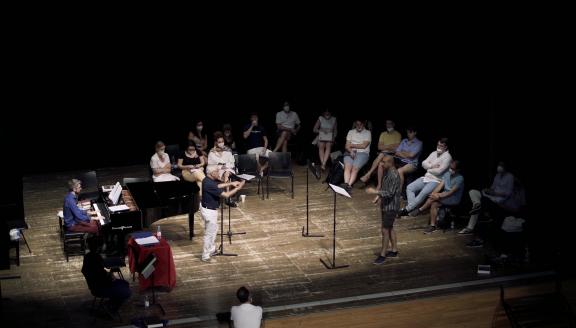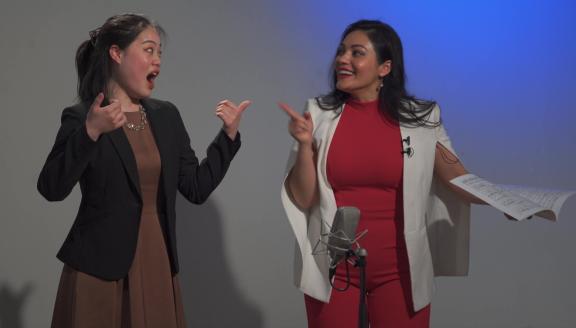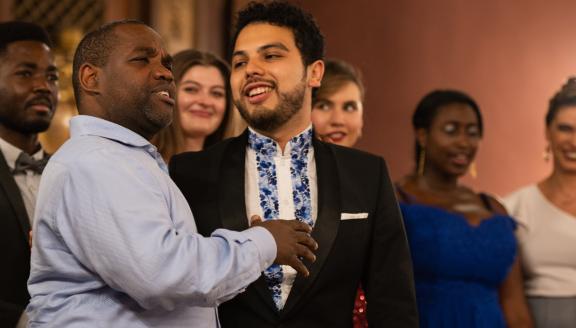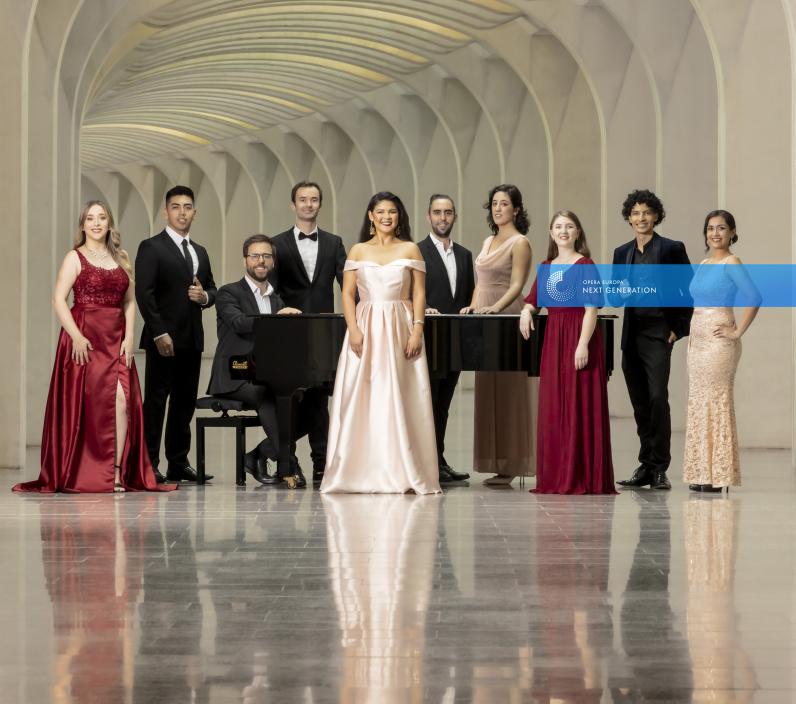
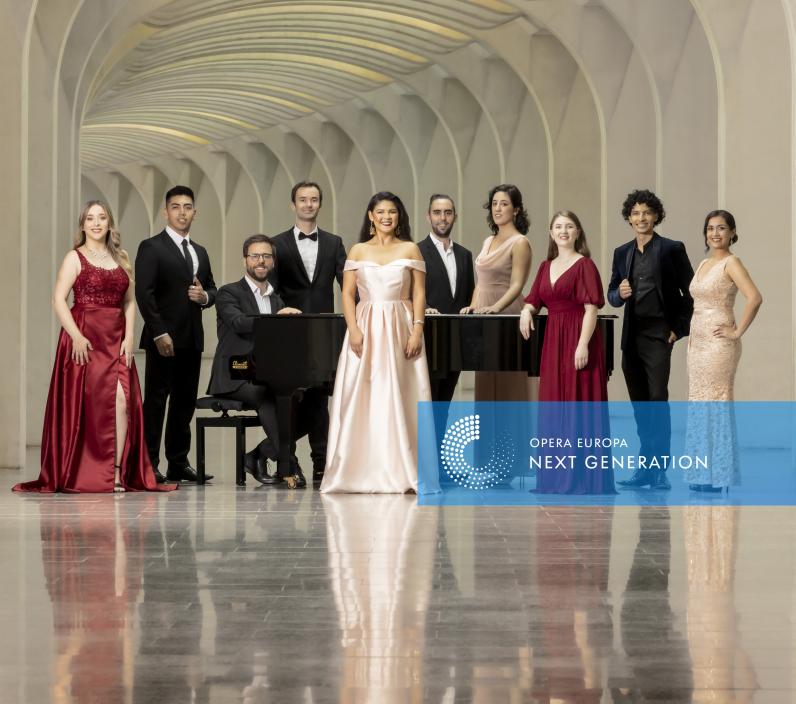
What is up with the Next Generation?
What is up with the Next Generation?
Perhaps you have already noticed this new, bright blue logo: Opera Europa Next Generation? No, this is not science fiction and has nothing to do with spaceships or distant galaxies. It is a new programme supported by the European Commission that enables OperaVision to expand its digital programme to support young artists – the next generation of opera professionals. On OperaVision, you can enjoy many full performances made by artists with illustrious careers. Such careers start somewhere; emerging talents are not simply beamed down to earth! On their way to a big role in a big opera house, they pass through several stages. Find out more about the steps for emerging artists below.
The Education – more than just voice training
In the education of opera singers at music universities and conservatories, the technical training of their main tool, the voice, plays a central role. Many muscles – from the diaphragm, which acts as the support, to the vocal cords, tongue and lips – are involved in singing, and their interaction must be well coordinated so that the voice can radiate from the opera stage many metres into the auditorium. And that is a high-performance sport! Just like an athlete who runs laps around the stadium every day to prepare for a competition, an opera singer learns how to keep their voice strong, flexible and healthy – because sometimes, a three-hour opera can feel like a real marathon for the performers.
Everybody is individual, and so is the singing voice. Whether a singer becomes, say, a lyric tenor or a heldentenor is something to do with nature’s gift but it can also be shaped and defined through appropriate training. You can read more about the different voice types here.
As an opera singer, however, you need more than just a secure voice. Musical theatre productions require acting skills, which are trained through scenic lessons. Singers often learn a new role while they are still in rehearsals for another; studying roles and repertoire prepares them for the range of styles and roles in opera. In most cases, the young artists also improve their language skills, which help them to understand and sing in foreign languages. The training usually concludes with the students performing their own opera production.
The Opera Studio – between studies and employment
Rarely a singer is offered a permanent position with an opera company immediately after completing their education. A good support for young talents at the start of their career is the opera studio, sometimes also called academy, young ensemble or young artists programme. The opera studio is an opportunity for singers to apply the skills they have acquired during their training in a professional context. For a limited period of time (usually one or two years), the young artists are employed by an opera house, where they receive further training in the most important disciplines. In masterclasses – individual coaching sessions with experienced singers – they receive additional input. The members of the opera studio are also cast for smaller roles in regular productions, which for many can be their first time, their debut, on a major opera stage.
Sometimes the opera studio also welcomes pianists who then go on to work for opera companies as so-called répétiteurs: they support singers in learning new roles or play the musical accompaniment in rehearsals without an orchestra. It is just as important for them to know a large repertoire as well as to learn to adapt quickly to different voice types and to breathe together with the singers.
Coaching – lifelong learning
Beyond training and opera studios, coaching and mentoring accompany professional opera singers throughout their lives. There are a large number of specialised coaches who use their expertise to work in a wide variety of fields in the opera business:
• Many singers have private vocal coaches who regularly provide their students with valuable tips and tricks for a well-trained voice.
• Bel canto, early music, baroque, romantic or contemporary opera – every era and every genre have different demands on the interpreter, which cannot possibly be completely covered in the years of training. For this reason, there are also style experts from whom young talents can learn, for example in masterclasses.
• Language coaches (often former singers themselves) help with correct pronunciation and give technical tips on how to best sing certain languages. After all, not every singer is fluent in all the languages of the operas they sing. In the international opera world, it can happen that a French soprano performs Mimì (in Italian) one day in Spain and Rusalka (in Czech) the next day in Germany.
• Movement training helps to keep not only the voice but also the body fit and well prepared for scenic action on stage.
• There are also courses on stage presence, contract management or bookkeeping – and many more!
Auditions – an art in itself
Auditions are part of the everyday business of rising opera stars. Whether in competitions, by invitation or as part of an open audition, the artists often only have a few minutes to make a lasting impression on a jury, an audience or the management of an opera house with a selected aria and, in the best case, to be hired. The audition is a complex process, whose success depends on many factors. Some of the steps are:
• Choosing the competition or the opera house. Competitions can have very different focuses in terms of era (e.g. baroque or contemporary music) or style (e.g. song, oratorio or opera). Opera houses may also have different expectations towards a new ensemble member. Perhaps the company already has enough permanent tenors and urgently needs a solid baritone, or they are looking for singers with a strong performative energy because the house offers many interactive productions for young audiences.
• Choosing the title. Unless there is a compulsory piece, the singer is spoilt for choice. Which music suits their voice particularly well? Do they want to present themselves as an expert in Romantic music or as a more versatile singer? Which aria can they perform with confidence after a long train journey which perhaps departed before the crack of dawn?
• The live performance. A jury or an artistic director, who may have witnessed hundreds of auditions, look very closely at how the singers enter the stage. What attitude do they have, do they seem shy or confident, how do they approach the jury – and how do they exit the stage after singing?
• The decision. Sometimes singers receive a rejection, sometimes several offers. Then the young artists have to stay strong and, for the lucky few, to weigh up what to choose. Whilst one role may promise stylistic development, could a permanent position be waiting elsewhere?
It is particularly important for young singers to try out their skills in competitions and auditions, and to be patient in the process. Because some roles that you really want only come after years of professional experience!
The right age for the right roles,
or Why not sing Wagner at 22?
Perhaps you are familiar with the story of the tragic lovers Tristan and Isolde? Perhaps you have seen Richard Wagner’s famous opera of the same name and wondered why the roles of the young lovers were without exception performed by somewhat older singers? Well, not every opera is suitable for beginners. Wagner roles in particular are considered challenging, as they demand a lot from the performers. Norwegian soprano Kirsten Flagstad, one of the greatest Wagner interpreters of the 20th century, said in an interview in 1950: “My first piece of advice to young and immature singers can be put into three words: Leave Wagner alone. Because it calls for power which can only develop after many years of singing. […] For the really heavy parts, like Isolde or Brünhilde, you need even more: A perfectly placed voice, absolute control of the breath and immense staying power.”
There is not the right opera for young singers. However, some conventions have been established at universities and conservatoires. For example, works with many smaller roles that can be rehearsed quickly and choirs in which many students can be involved are particularly suitable. Classical and baroque operas are often chosen, as this type of singing is usually gentler on the voice than a powerful Wagner or Strauss role, which, moreover, usually has to push through over a larger and louder orchestra. Works from the 20th and 21st centuries can also be found in the programmes of the universities, which are suitable for training for various reasons. In addition to true classics such as Mozart’s Magic Flute or Puccini’s Gianni Schicchi, operas by Rossini, Monteverdi, Purcell or Britten are also popular university productions – and so many more…
What repertoire will the talents of tomorrow present? What career paths will they take? How do they prepare for their great singing careers and what surprises does the next generation of the opera world have in store? All this you can discover on OperaVision. Stay tuned!
Hannes Föst
Translated from the German original




